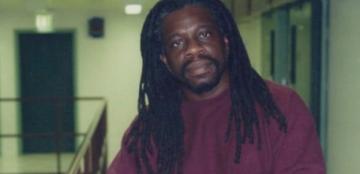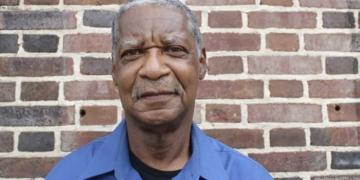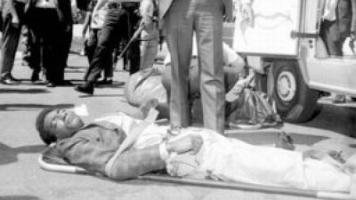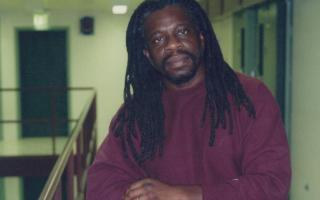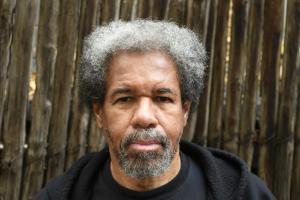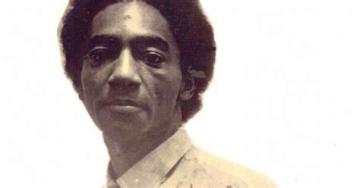Having endured 50 years of incarceration, Fitzgerald was California’s longest-serving former Black Panther.
“He was a favorite of many in the communities he served.”
Black revolutionary struggle in the US finds itself in a moment where it must contend with two different beasts. One is a well funded liberal agenda that is hell bent on co-opting radical imagery and language to position itself as the face of The Movement. It’s the Black Lives Matter Cadillac Machine constantly questioning why activists shouldn’t live lives of luxury. The second is a paternalistic and often violent “White Left” obsessed with dictating the terms and conditions of “principled struggle.” It’s the “If Marx didn’t say that then it’s revisionist” machine. And while both sides play a tug of war on a generation of budding radical struggle, neither offers any support by way of resources or true solidarity. And this is most present in the deadly silence surrounding the African political prisoners dying and being held hostage in this country.
On March 29, 2021, the African Liberation Struggle gained a new ancestor, Romaine “Chip” Fitzgerald. Chip Fitzgerald, a former member of Black Panther Party for Self Defense, was a 50 year hostage of the California prison system, making him California’s longest-serving Black Panther.
In the days to come, people will rehash the details of Chip Fitzgerald’s conviction, centering questions of guilt or innocence, asking whether or not he deserved 50 years, and focusing on the intense brutality of his final years in prison. But what moral leg does the United Snakes of America have to stand on in a dilemma of any African person’s guilt or innocence? How can any nation built on ongoing genocide and enslavement ever serve as any moral compass? So here, I choose not to center any of those things. Let us remember our ancestor by examining the lessons that his life can teach us.
“What moral leg does the United Snakes of America have to stand on in a dilemma of any African person’s guilt or innocence?”
Like many young Black men of his era, Chip grew up in the poverty and destitution that was designed by the US for Black people in areas like Watts and Compton. As a product of his environment he had a few run-ins with the law. Poverty tends to breed that sort of thing. But his life changed forever after a stint in prison where he was exposed to prisoners who’d formed reading groups. These groups gave him a sense of the importance of Black history and Black culture and helped develop his analysis of the conditions that shaped his community. While he was locked up in 1967, he stumbled on literature about the Black Panther Party and decided he wanted to know more. The Panther literature he saw talked about things like capitalism and colonialism, and even as his first introductions to the concepts, his thirst for knowledge was insatiable. From behind bars, that basic political education motivated him to devote his life to the freedom struggle and to the ideals for which organizations like the Black Panther Party stood. When he was released, he and a group of fellow former prisoners linked up with the Southern California Chapter of the Black Panther Party. We need to ask ourselves how many of our organizations are willing to organize former prisoners? And for those of us who are able bodied, gainfully employed, not locked behind bars, and not a part of revolutionary formations, what is stopping us from walking outside right now to join an organization fighting the liberation of our people? And what is our fucking beef with reading books?
Inside the Panthers, Chip found purpose. He didn’t join to not show up to meetings. He didn’t join to participate in unconstructive gossip and criticism; he joined to work. From education and housing initiatives to selling the Black Panther Party newspaper to the free breakfast program, Chip is remembered as an enthusiastic member of the party. “He became enthralled with the positive work of refashioning his community from one that was oppressed, excluded and subservient to one that was self-determining and self-sufficient.”
“How many of our organizations are willing to organize former prisoners?”
Bruce Richard, who joined the Black Panther Party’s Southern California Chapter in 1969 with Chip, recalled that “… to be a Panther was a 24/7 commitment, and every single day seemed like weeks due to the volume of activities during that explosive period. Chip Fitzgerald was totally consumed by his work in the Party’s Free Breakfast Program, the tutoring program, selling Panther papers, attending political education classes and distributing leaflets throughout the community that explained the philosophy and objectives of the Black Panther Party. He was a favorite of many in the communities we served. The children especially loved him, as was often reflected in their smiling little faces when he appeared.” And while many today deny the need for consistent political education, we cannot overlook the fact that Chip Fitzgerald’s introduction to revolutionary self defense did not come through a gun, but through a book. While Chip Fitzgerald was slanging meals and newspapers, he was also learning the principles of socialism, the importance of organization, and when relevant, the proper way to handle firearms. Thomas Sankara taught us that “a soldier without any political or ideological training is a potential criminal.”
Romaine “Chip” Fitzgerald was no one’s potential criminal. He was a revolutionary minded African with an undying love for his people and a willingness to die for the cause of liberation. And this week, he cashed out on the ultimate price. He paid that price after more than 50 years of imprisonment at the hands of a country that doesn’t even have the right to hold mice in a cage. He paid that price after more than 50 years of self reflection and self criticism— daydreaming of the day he would do basic things we take for granted every day. Like teaching his grandchildren to ride a bike. Or sitting outside and listening to the song of the nearest bird. He wanted to see the moon and experience his own bed again. He traded a life of experiences we take for granted every day, just so that we’d have a fighting chance at revolution.
We owe a debt to him and every political prisoner still behind bars to make the most of the life we have. Every morning we wake up, let’s ask ourselves how serious we intend to be that day. How can we be more dedicated members of our organizations? What sectors of our communities remain unorganized? Are we showing up to do this work enthusiastically? How are we in unity with those who remain behind bars like Mumia Abu Jamal, Russell Maroon Schultz, Rev. Joy Powell, Sundiata Acoli and Jamil Al-Amin? What will be our contribution to the most historic struggle for self determination that man has ever known? And how can we be more like Chip? Rest in power to our revolutionary ancestor. His example reminds us that we can make no compromise, and we can make no retreat. The war has already been waged.
Salifu Sesay Mack is an editor at Hood Communist and a member of BAP, the AAPRP and the Lowcountry Action Committee.
This article previously appeared on Hood Communist.
COMMENTS?
Please join the conversation on Black Agenda Report's Facebook page at http://facebook.com/blackagendareport
Or, you can comment by emailing us at comments@blackagendareport.com

